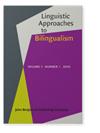使用同一种语言的两种变体对认知的影响
IF 1.8
2区 文学
0 LANGUAGE & LINGUISTICS
引用次数: 3
摘要
尽管双语是否以及如何影响执行功能的问题已经引起了广泛的争论,但人们很少关注同一语言不同变体的说话者在双语和双语等语言情况下的认知能力。与双语情况类似,在双语言主义和双语言主义中,说话者有两种同时活跃的语言变体。然而,有人认为,这些情况可能会提供各种各样的机会,甚至可能更少的机会在不同的变体之间混合或切换,这反过来可能会导致与双语者不同的认知结果。在这里,我们回顾了关于双语和双语对认知影响的现有证据,并将其与双语对认知的影响理论进行了比较。我们的结论是,对双语、双语和双语的调查必须考虑到对话的背景,特别是这提供的语言转换的机会。本文章由计算机程序翻译,如有差异,请以英文原文为准。
The effects of using two varieties of one language on cognition
Although the question of whether and how bilingualism affects executive functions has been extensively debated,
less attention has been paid to the cognitive abilities of speakers of different varieties of the same language, in linguistic
situations such as bidialectalism and diglossia. Similarly to the bilingual situation, in bidialectalism and diglossia speakers
have two language varieties that are active at the same time. However, these situations have been argued to potentially provide
varied, and possibly fewer, opportunities for mixing or switching between the varieties, which may in turn lead to different
cognitive outcomes than those reported in bilingualism. Here we review the available evidence on the effects of bidialectalism and
diglossia on cognition, and evaluate it in relation to theories of the effects of bilingualism on cognition. We conclude that
investigations of bilingualism, bidialectalism and diglossia must take into account the conversational context and, in particular,
the opportunities for language switching that this affords.
求助全文
通过发布文献求助,成功后即可免费获取论文全文。
去求助
来源期刊

Linguistic Approaches To Bilingualism
Social Sciences-Linguistics and Language
CiteScore
3.20
自引率
9.10%
发文量
24
期刊介绍:
LAB provides an outlet for cutting-edge, contemporary studies on bilingualism. LAB assumes a broad definition of bilingualism, including: adult L2 acquisition, simultaneous child bilingualism, child L2 acquisition, adult heritage speaker competence, L1 attrition in L2/Ln environments, and adult L3/Ln acquisition. LAB solicits high quality articles of original research assuming any cognitive science approach to understanding the mental representation of bilingual language competence and performance, including cognitive linguistics, emergentism/connectionism, generative theories, psycholinguistic and processing accounts, and covering typical and atypical populations.
 求助内容:
求助内容: 应助结果提醒方式:
应助结果提醒方式:


